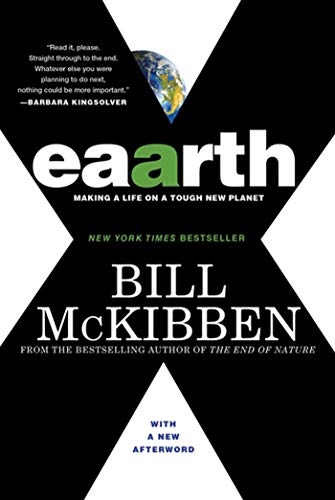Eaarth: Making a Life on a Tough New Planet / McKibben, Bill
| List Price: | |
Our Price: $14.29 | |
|
For Bulk orders
| |
|
Used Book Price: | |
| Eaarth: Making a Life on a Tough New Planet / McKibben, Bill | |
| Publisher: St. Martin's Griffin | |
| Availability:In Stock. | |
| Sales Rank: 220725 | |
|
Amazon Exclusive: A Conversation Between Curt Stager and Bill McKibben
Curt Stager is the author of Deep Future: The Next 100,000 Years of Life on Earth.

Bill McKibben: How'd you come to worry about this global warming stuff in the first place?
Curt Stager: When your book, The End of Nature, first came out, I already knew about global warming but wasn't very worried about it yet. I'm a paleoclimatologist, so I was used to thinking about huge climatic changes of the distant past, and I also wasn't convinced by what was then the available evidence that humans are driving most of today's trend. But now so many excellent studies clearly demonstrate our central role in the warming of the last 30-40 years that I've moved on from "is it really happening" mode to "what does it mean" and "what can we do about it?" Another factor was a project that you asked me to do in support of one of your articles several years ago - to study the weather records in our home region in and around northern New York and Vermont. The latest data show that much of this area is actually warming faster than the global average, and ice stays on our lakes two weeks less in an average winter than it did a century ago. Because of all this, I suppose you could say that I'm a "reformed climate skeptic" now.
Bill McKibben: What kind of timescales do we need to be thinking on to really understand what's happening?
Curt Stager: We've got to expand our view of this issue a thousand-fold to really grasp it. According to the latest research, much of the heat-trapping carbon dioxide we release during our lifetimes will linger in the air not just for centuries but for tens of thousands of years, long enough to affect future ice ages.
Curt Stager: Eaarth is one of the most amazing book titles I've ever seen; in a single word it beautifully captures the essence of what you're trying to tell us about our influences on the planet. How did you come by it?
Bill McKibben: Well, I wanted a way to get across the idea that we're already living on an altered planet. Not as altered as it's going to be, but--for people my age, the iconic image of our planet was that first photo back from the Apollo spacecraft. And the world does not look like that any more. A lot less white up top! Somehow we have to figure out how to get the message across that global warming is not a problem for the future, it's a desperate crisis already.
Bill McKibben: Scientists are forever struggling to communicate effectively with the general public. You're a whiz at it, as this book, and your work in places like National Geographic, make clear. What advice would you give your colleagues?
Curt Stager: That's a fine compliment coming from a master wordsmith like yourself, but it's particularly nice to hear in my case because when I first started my scientific career, back in the 1980s, communicating with the public was openly frowned upon. Nowadays I'm glad to see that it's much more widely accepted, even encouraged, and there are many great opportunities for scientists to be trained in such things. I was fortunate enough to attend a public communications workshop sponsored by the National Science Foundation, for example. But don't be fooled, you science types; there's a lot more to writing effectively for the public than you may think. When it's done properly it appears smooth and natural, but that's not because it's easy; it's a sign of skill and effort. Pay this craft the respect it deserves and learn from people who know what they're doing, then go out and really earn your grants by letting us all know how you spent our tax dollars!
Curt Stager: You do a good job of keeping up with the latest developments in climate research even though you're not a professional scientist. Do you have any advice in that regard for non-science types who are trying to wade through the information jungle in search of current, reliable information about climate change?
Bill McKibben: Like any other huge field, you need some guides--picking someone like Jim Hansen who's been right again and again seems like a good strategy. You need to keep abreast of the important science as it develops. And you need to find some journalists who have paid attention for a long time: Bryan Walsh at Time, Andy Revkin at the New York Times, and so forth. But the trick is not to be too caught up in the details, and keep your eye on the main current: the debate about whether we're warming the planet is no longer interesting. What's interesting is what we're going to do about it.
Now you can buy Books online in USA,UK, India and more than 100 countries.
*Terms and Conditions apply
Disclaimer: All product data on this page belongs to
 .
.No guarantees are made as to accuracy of prices and information.










